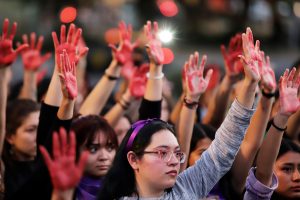Advent 2021. The end of another strange and tumultuous year. My thoughts and prayers cover a lot of ground as I am acutely aware of the suffering and pain in so many households. The relentless nature of the global pandemic has not given us a chance to heal and grieve properly. It’s still lurking in the background, even as we allow ourselves to cautiously prepare for joyful and much needed Christmas reunions, allowed this year.
I have become aware of another form of pandemic, one that has been with us since long before Covid 19 – the pandemic of violence that targets women and girls, simply because they are women and girls. This form of violence sits at the top of an awkward pyramid – at the bottom, rooted in strong foundations, are examples of everyday sexism, bias and gender inequality. These have baked into us notions that boys shouldn’t cry, so they express their feelings through violence or suppress them altogether. These notions pressure girls to make the sandwiches and serve others instead of influencing decisions in meeting rooms. They teach girls not to walk outside after dark. Aside from being an impossible ask for women and girls in Scotland in winter, we as a society should not be asking girls and women to sacrifice their freedom for safety when we aren’t loudly calling for an end to this violence from men.
Gender inequality, leading to violence against women, builds up through generations of cultural norms which justify unequal roles and powers, and trivialise violence perpetrated against women. These norms lead to a high number of men dying by suicide as well as at the hands of other men. They lead to women being killed because they said no, for taking autonomy over their bodies and lives, for being in the wrong place at the wrong time.
At Christmas, police report a marked increase in incidents and reports of domestic abuse (includes physical and psychological abuse) where women are over-represented as victims. Christmas is a time when families spend sustained periods of time together with ample opportunities for perpetrators to start arguments, punish and control. It doesn’t all occur at home – Christmas parties, clubs and the street are also sites of violence, where women are subjected to harassment and assault.
“Across their lifetime, 1 in 3 women will experience some of physical or sexual violence from an intimate or non-intimate partner”.
This number has remained relatively unchanged for over a decade. 1 in 4 of women aged 15-24 years who have been in a relationship will have already experienced violence by an intimate partner by the time they reach their mid-twenties. These statistics do not capture the women living with coercive control as a form of psychological violence, only recently recognised as a form of abuse by the UK and Scottish governments. Coercive control can go on for years, hidden in plain sight, and includes a pattern of behaviours like humiliation, threats and intimidation.
“Violence against women is endemic in every country and culture, causing harm to millions of women and their families, and has been exacerbated by the COVID-19 pandemic… But unlike COVID-19, violence against women cannot be stopped with a vaccine. We can only fight it with deep-rooted and sustained efforts – by governments, communities and individuals – to change harmful attitudes, improve access to opportunities and services for women and girls, and foster healthy and mutually respectful relationships.”
Dr. Tedros Adhanom Ghebreyesus, WHO Director-General
Through Integrity, the Church of Scotland’s Violence against Women task group, I have been actively involved in developing training aimed at recognising and emphasising the Church’s role in this issue. This involves reflecting on how cultures, theologies and mindsets have consciously and unconsciously shaped attitudes that justify or allow us to ignore sexism and misogyny. We, as a Church, need to be a place where women of faith, or no faith, can be understood if they disclose an experience they have suffered. We need to recognise the signs of abuse and violence and know what to do when we see them. We need to create a culture that shows a zero-tolerance attitude to trivialising any form of violence. Our role, in short, is critical.
In the new year Integrity will be launching its training for Kirk Sessions called Safe(r) Churches: The Role of the Church in Preventing, Recognising and Responding to Violence Against Women. They will have an open training in January.
Integrity also has a violence against women charter which offers a useful set of action points for Kirk Sessions. The Global 16 Days of Action to end Gender Based Violence is another great way to find out ways we can play our part in ending this devastating pandemic.
